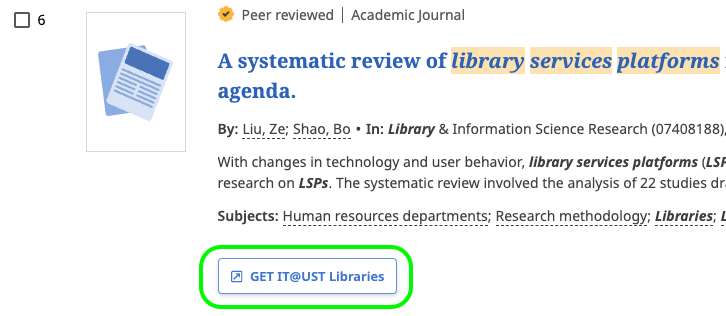Our primary theology and religion index, with over 470 titles in full text out of over 2,250 titles indexed, primarily academic journal articles, books, review, and essays: international in scope. Includes the contents of the Catholic Periodical and Literature Index. Produced by the American Theological Library Association.
Full text for thousands of peer-reviewed journals and general interest sources across many subject areas.
Abstracts (short summaries) from over 500 academic journals about the field of New Testament studies; international scope. Also abstracts books on related topics. Limited subject and/or citation searching.
Abstracts (short summaries) from over 500 academic journals about field of Old Testament studies; international scope. Also abstracts books on related topics. Limited subject and/or citation searching.
Access ebooks and scholarly journals in the arts, humanities, sciences, and the social sciences. Journal content is often not available until 1+ years after publication.
Searchable access to the full text of St Thomas-subscribed philosophy journals, plus indexing to dozens more.
Citation database including journals and books related to philosophy, ethics, aesthetics, social philosophy, political philosophy, epistemology, metaphysic logic, and the philosophy of law, religion, science, history, education, and language.
Google Books is an index of full-text books and magazines that Google has digitized. Materials are provided by publishers, authors, and partnering libraries through various Google programs. You can view the full-text of books in the public domain. For materials that have been digitized but still remain protected under copyright, Google often provides previews.


Click the GET IT@UST Libraries button or GET IT button in any database to get the full text of an article when a PDF is not available. If UST Libraries does not own it, you will be given an option to request it from another library.
Google Scholar is a freely accessible web search engine that indexes the full text of scholarly literature (journals) across an array of publishing formats and disciplines. It includes most peer-reviewed online journals. Use FIND IT@UST Libraries to get the full-text if not available in Google Scholar.
Periodicals are useful for three primary reasons: they...
- provide a wealth of valuable information that is current and timely
- contain the latest discussions on a topic
- cover topics not yet published in book form
Periodicals are created for different audiences. Some are for general readers and others for scholars and researchers.
Although the terms periodical, journal, serial and magazine have slightly different definitions, you will likely hear them used interchangeably. These are works that come out on a regular basis (weekly, monthly, annually) and contain articles written by various authors.
Scholarly peer review (also known as refereeing) is the process of subjecting an author's scholarly work, research, or ideas to the scrutiny of others who are experts in the same field, before a paper describing this work is published in a journal.There are anonymous and open reviews.
1) Determine the Key concepts of your topic
2) Define your key words / search terms.
3) Choose your databases and resources
4) Formulate the search statement
5) Refine and focus your results
6) Evaluate and manage the results
7) Locate the full articles
 Fuente academica [electronic resource].
Fuente academica [electronic resource].